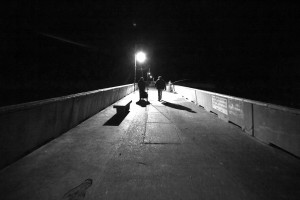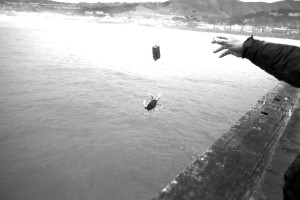Pacifica Pier, California: A sanctuary for local Filipino fishermen
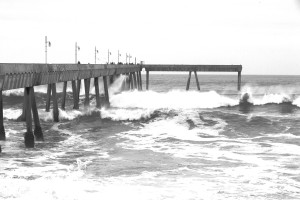
Pacifica Pier is a popular destination among locals to fish and crab. Beaches and shorelines are at risk by pollutants, which are changing the ocean’s chemistry. Committed to protecting and enhancing California’s coast and ocean, The California Coastal Commission was established in 1972 under voter initiative. It was later made permanent through adoption of the California Coast Act of 1976.
DALY CITY, California — Lanao del Norte native Art Marcial has been fishing since he was a young boy. These days the Daly City resident can be found fishing from as early as 4 a.m. off the Pacifica Pier.
Marcial says he eventually plans to retire to the Philippines, where he has already purchased land in Palawan, famed for its lagoons, pristine waters and the Puerto Princesa underground river. Until then, though, he’ll keep fishing in Pacifica.
Ding Ramos of Malolos, Bulacan, will keep fishing there too. Ramos is a retired mail carrier. Like Marcial he began fishing at a young age, and says his parents used to worry he would ditch school just to go fishing with older folks in the neighborhood. Today he operates a small business in his hometown raising prawns and crab for retail, and heads back to the Philippines every few months to oversee operations. In between visits he can often be found with rod in tow at the Pacifica Pier.
Bert de Guzman of Cavite, near Manila, has his father to thank for his early exposure to fishing. The father and son duo would head to Sangley Point to cast their lines.
The three men are part of a group of mostly-retired Filipinos who say the Pacifica Pier is like a sanctuary, providing a connection to the coast and to their beloved pastime. It’s a place to relax, to distress, get some exercise and hopefully catch some fish.
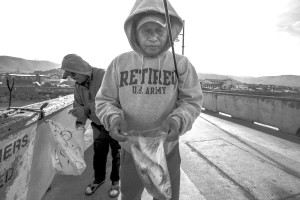
Sonny Santos is a retired US Army soldier who served in the Vietnam War.
It also provides a front row seat to many of the challenges facing the coast today, notably from sea level rise and rising rates of pollution.
Accessible pier
All three men say they enjoy the fact that the pier is accessible. It’s close to their home in Daly City, and parking is for the most part readily available.
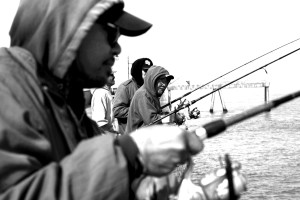
This group of Filipino fishermen usually spend all day crabbing at the Pacifica Pier from 5 a.m. until late in the afternoon.
But they do say they’ve seen a decline in the catch of late, especially for crab. They also worry about the possibility of sea rise eventually impacting their preferred fishing place.
A new state-commissioned study found that sea levels could rise 30 to 40 times faster than last century, threatening low lying cities like Pacifica and irreparably damaging the states $44 billion coastal industry.
Their more immediate concern, however, is with the number of smokers along the pier who toss their cigarette butts into the waters below.
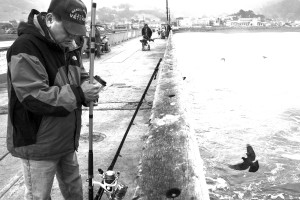
A ten-foot fishing pole with a 10-lb. line and a decent reel costs a little over $100 US dollars.
The Ocean Conservancy estimates that upwards of 176 million pounds of cigarette butts are thrown away every year in the United States. Much of that finds its way onto beaches and into the ocean, polluting local waters and contaminating fish sources.
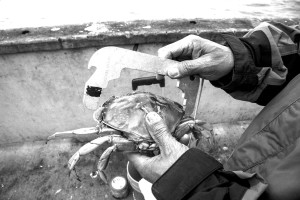
The size of the catch is regulated by the Fish and Game Commission. Anything below 6 inches wide has to be thrown back into the sea.
Because they are filled with plastic particles, cigarette butts do not actually biodegrade. Instead, the particles find their way into sea life that ingest the plastic and eventually onto dinner plates in the form of caught fish or crab.
People caught tossing their cigarette butts are subject to a fine. But Marcial and the others say agencies like the Coastal Commission should do more to enforce anti-littering laws at the pier and along the coast.
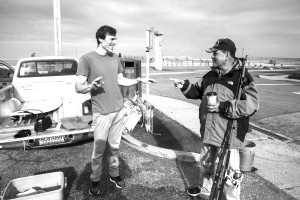
Sonny Santos enjoying a light moment with Chris, a surfing fanatic, at the parking lot near the Pacifica Pier.
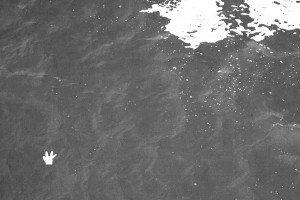
A surgical glove is floating in the ocean. Beaches and shorelines are at risk by pollutants, which are changing the ocean’s chemistry. Committed to protecting and enhancing California’s coast and ocean, The California Coastal Commission was established in 1972 under voter initiative. It was later made permanent through adoption of the California Coast Act of 1976.
They are skeptical, though, about how much the Commission can actually accomplish, especially in light of proposed cuts by the Trump administration. According to some figures the cuts to the Coastal Commission, which regulates things like access and development along the 1100-mile California coast, could be as high as 10 percent.
Dependent as they are on the sea, all three say they support any effort to protect California’s coastline. They want to be sure the pier and all it offers is there for their children and future generations.
(This project was completed with support from New America Media’s California’s Coast: A Time of Reckoning Fellowship Program.)

